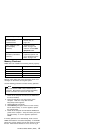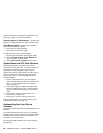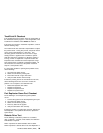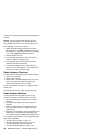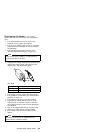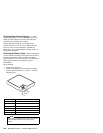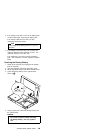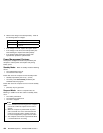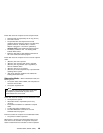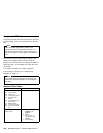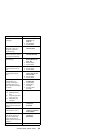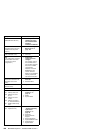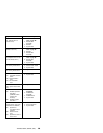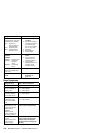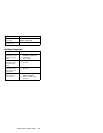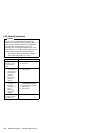
Events that cause the computer to enter suspend mode:
Suspend mode is requested by the Fn key (Fn+F4).
The LCD is closed.
The specified time has elapsed from the last
operation with the keyboard, mouse, hard disk drive,
parallel connector, or diskette drive; or the AC
Adapter is plugged in. The time is specified by
Suspend Timer
in the ThinkPad Features program.
The battery condition is low. The battery power
indicator blinks amber.
Either the
PS2 OFF
or
PS2 SUSpend
command is
set in the ThinkPad Features program.
Events that cause the computer to exit or resume suspend
mode:
(Resume) The LCD is opened.
(Resume) The real time clock alarm is signaled.
(Resume) The ring indicator (RI) is signaled by a
serial or PCMCIA device.
(Resume) The Fn key is pressed.
(Resume) An external keyboard key is pressed while
operating with ac power.
(Exit) Timer (timeout) conditions are satisfied for
entering hibernation mode.
Hibernation Mode: When in hibernation mode, the
following occurs:
The system status, RAM, VRAM, and setup data are
stored on the hard disk.
The system is powered off.
Note
The computer cannot enter hibernation mode when
the computer is powered with ac power and a
communication PC card is used.
Events that cause the computer to enter hibernation mode:
The keyboard is opened.
Hibernation mode is requested by the Fn key
(Fn+F12).
Timer/timeout conditions are satisfied in suspend
mode.
A critical low battery condition occurs.
The
PS2 HIB
ernation command is set in the
ThinkPad Features program.
Event that causes the computer to exit hibernation mode:
The power-on switch is operated.
When power is turned on, the hibernation history in the
boot record on the hard disk is recognized and system
status is restored from the hard disk to resume operation.
ThinkPad 365X, 365XD (2625) 105



